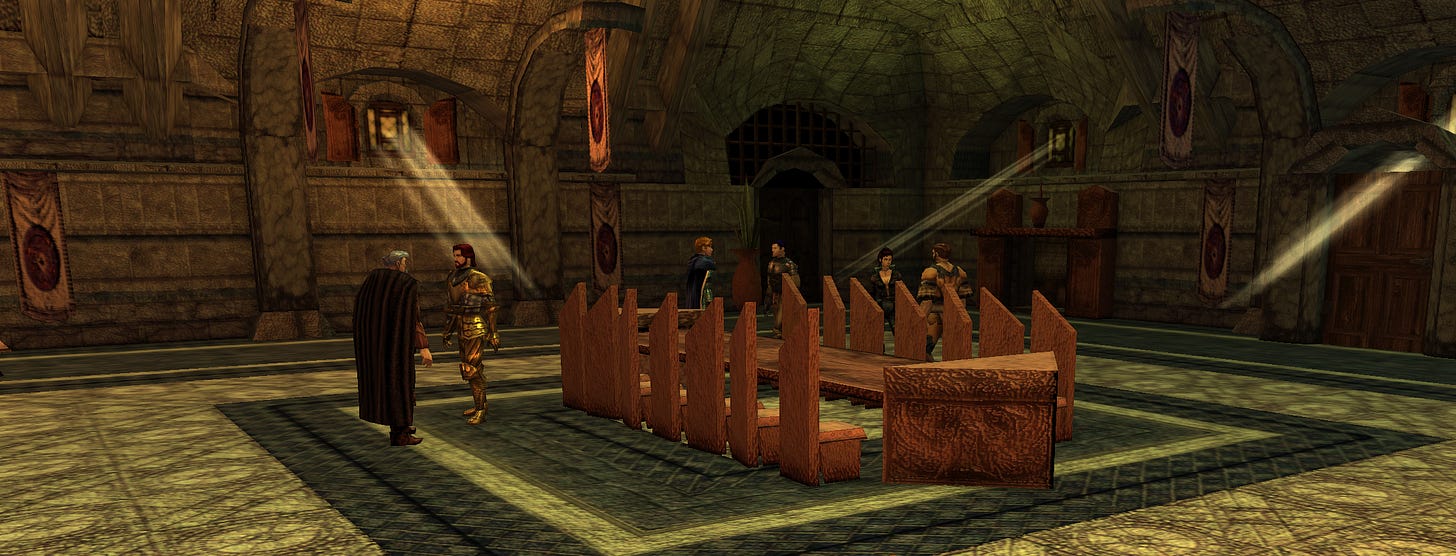The Calm Before the Storm, Scene 1
Lord Rugon paced before the balcony of the palace conference room. “Your Highness, I must once again respectfully protest this precipitous course of action,” he said.
“And I must once again insist on my resolve in undertaking it,” King Danor answered patiently.
The lord paused to look at him. For all his dignified manner — the royal advisor was meticulous about maintaining it, no matter the circumstances — he was beginning to look like a trapped animal. The balcony was open to face the mountainside, and it framed him in the view of the High Council. The way the ground dropped suddenly away from the railing around it only reinforced the impression.
Nowhere to run, Queen Elena mused, naming the thought to herself.
Danor forced himself not to nod. Her magic had allowed them to develop a mental bond over the years that let them share each other’s thoughts and feelings. Few outside their family knew of it, and its advantages encouraged them to keep it that way.
He’s been doing everything he can to delay this, she continued. But now he’s run out of options. And he knows it.
Danor spared a glance at her. She sat to his right at the great bronzewood conference table. The seating was deliberate; she had been his partner in ruling the Kingdom of Carlissa since their marriage twenty-eight years earlier.
Elena’s rosy skin, high cheekbones and elegant bearing betrayed her lineage from the elven royalty of the Eastern Continent. Her shining hair was tied into a long golden braid that reached to the small of her back. The daughter of Queen Talina of Elde and the Peregrine King of Mount Cassandra, she was beautiful even by the already high standards of her people. Her deep blue eyes watched the lord’s consternation with just a hint of amusement.
The King shifted in his seat, and the muscles of his upper body flexed visibly beneath his ornate cape. He had chosen it to give added formality to the meeting, and to signal his determination to move forward with his plan. The move had clearly not been lost on Lord Rugon.
Danor’s sword lay at the center of the conference table. Guardian was an enchanted blade, a large, two-handed weapon of nearly pure bluesteel that had been handed down in his family for generations. It was a tradition of the High Council for the King to lay his weapon on the table before them, a symbol of the Crown setting aside force in favor of reason and persuasion in its deliberations.
“And these steps are not being taken precipitously,” Danor continued. “Your wise counsel has helped to ensure that. Thanks to your suggestions, we have amended the new constitution so that some of its changes will be introduced more gradually.”
Lord Rugon started to respond, but the King cut him off. “Even my father, the Archmage, was swayed by the prudence of your words about ‘avoiding social upheaval,’ as you so eloquently put it. Great care has been taken to address those concerns, but that work is now done. The time has come to review the document’s final editing, and to prepare it for proclamation.”
“It’s just that ...” Lord Rugon began. He paused, appearing flustered, groping for words.
“I’m concerned that these proposals need more study,” he continued at last. “With respect, my liege, customs and social institutions should not be changed without grave caution! They developed over the course of centuries, and have stood the tests of time. These new ideas … they are bold, to be sure, and some perhaps would seem to have merit in thought and on paper. But they are so untried! If you would hear my counsel, it would be to take the time to test them out first. One at a time, and in a limited way, under carefully controlled conditions …”
Danor held up his hand. “Haven’t we already had this conversation, Cyrus? Nigh on a dozen times, I think, though I’ve long since stopped counting. Your trepidation has been noted. To the extent that it has been deemed prudent, allowance has been made for it. Further delay is unwarranted, unless we are to bring the new constitution’s principles again under question. And to that, I say we are not. We have debated, and the decision has been made. The vote of the High Council has spoken.”
Lord Rugon looked around the room. More than a dozen faces regarded him from their seats at the massive conference table. A few wore expressions of support and empathy. These included Salmanor Hardin, the high priest and Lord Inquisitor of the Church of the Divine in Carlissa. The majority, however, were clearly in sympathy with the King. A few — Prince Aron in particular, Danor’s eldest son and heir to the throne — were openly hostile. He would not find support to delay the proclamation any longer.
Slowly, and with an air of resignation, he bowed. “Very well, Your Highness. It is as you say. Whatever my counsel, I remain your faithful servant, in this and in all things. If the Council is determined to proceed, then I recommend that each article of the new constitution be read aloud as review. It should then be confirmed with a yea or nay vote to publish it as written.”
The room seemed to relax, and Danor nodded his approval. “I agree. Aron, my son, will you do us the honor of reading the articles for confirmation?”
“Of course, Father,” the prince replied.
Several parchments were laid out before him. He took one, and without pause, began to read.
“Let it be known that these are the words of the King and of the High Council of Carlissa, in proclamation this day, the sixth of Floren, in the year 1643 of the Taming.
“There are times when an evolution of thought among men of learning, of conscience, and of good will impels them to undertake a reform of the very institutions by which they order their lives. Such an evolution faces us today, in the form of a growing recognition of the rights of reasoning beings, and of the freedoms to which they are by their nature entitled. It calls us to respond with this Constitution of the Kingdom of Carlissa, which is hereby proclaimed. Let all who hear or read it know that its articles shall not only have the force of law, but shall henceforth be the very basis of law in our land.”
Aron paused for a response. No one spoke, but a few heads nodded absently. This was just the preamble, and no one seemed to think it needed a vote.
“‘Article One. The practice of involuntary servitude is hereby outlawed in the land of Carlissa. All slaves and indentured servants are immediately declared free. Anyone attempting henceforth to keep or traffic in slaves in any form or manner within the borders of the kingdom shall be prosecuted for the crime of kidnapping.
“‘Section One. Any person entering the borders of Carlissa, if they be declared slave in another land, shall upon request immediately be granted sanctuary. Anyone attempting to interfere by force with such a request within the borders of the kingdom shall be prosecuted for the crime of kidnapping.
“‘Section Two. No claim for compensation to former slave-owners from the consequences of this article shall be upheld or enforced by any court or branch of the government of Carlissa.’
“That’s the full text of the article. All in favor, raise your hand and say ‘Aye.’”
The assembled lords all signaled their agreement. No one was surprised; the article outlawing slavery had been the least controversial of the new constitution’s proposals. The sale of slaves had been prohibited by decree since the old Archmage had assumed the throne years ago, and few vestiges of the institution remained. Travelers bringing them across Carlissa’s borders, however, had posed a lingering problem. It had led to diplomatic incidents, especially with the Kingdom of Rayche, which still practiced it in its southern cities near the Tiberax Archipelago. The second section was intended to warn travelers not to bring slaves with them to Carlissa, and to take a clear stand with other nations that any who entered the kingdom would not be returned.
“‘Article Two. The Kingdom of Carlissa recognizes the right of all people to the peaceful exercise of freedom of speech, and of association. The government of Carlissa shall enact no law, nor shall those who administer its powers take any action, to prohibit the peaceful exercise of these fundamental liberties.
“‘Section One. This article shall not be construed to protect non-peaceful speech and association. Speech in support of violent crimes or aggression against the people of Carlissa shall be considered and punished as accessory to, and conspiracy to commit, said crimes and aggression.
“‘Section Two. This article shall not be construed to establish a prohibition of any kind on the peaceful expression of disagreement with the speech of others, or any refusal to associate with them. Non-violent ostracism and other acts of social disapproval shall be recognized as expressions of free speech and association under the meaning of this act.’
“All in favor, raise your hand and say ‘Aye.’”
This one was more controversial, and it was reflected in the vote. Salmanor Hardin made a deliberate show of folding his arms across his chest and glaring at the prince in defiance. Everyone understood that this measure would restrict the power of the Church by neutering the blasphemy laws. Chaos and evil would reign, Hardin had raged in their debates, if demon worshippers were allowed to preach their sacrilege without fear of a warrior-priest’s sword. Yes, the Church had been known at times for an excess of zeal in such prosecutions, and a few had been put to the fire that were later shown to be innocent. But the right way to address these problems was through safeguards, ones that the high priest would be happy to oversee personally.
Other hands remained lowered. Lady Rayne, recently appointed chancellor of the Bard’s College, was an outspoken opponent of the rebellion against the traditional arts that was growing in the land’s taverns and alehouses. It needed to be outlawed before it could spread further, she had argued, not given such an explicit sanction. Lord Desmond, the Marquis of Seacrest, had disciplined commoners for impertinence on several occasions. Baronet Kuhl, representative of the Carlissan Trade Guild, had opposed nearly every article of the new constitution, and this one was no exception.
They were, however, the only dissenters. The article was quickly approved with no need to count the vote.
“‘Article Three. The granting of royal monopolies, including those over participation in trade and commerce, is hereby abolished …’”
The morning wore on as the High Council approved the provisions of the new constitution. The result had been known ahead of time by everyone present. The most controversial proposals, which had proved too liberal even for most reformers on the council, had already been set aside, and the rest reworked until they could command the needed support. Whether they thought it for good or for ill, everyone in the room knew that the winds of change were stirring in the Kingdom of Carlissa.
Next: Chapter 4, Scene 2 - The Secret Glade
The Secret Glade
The Calm Before the Storm, Scene 2
“Don’t remind me. And don’t get me wrong. I love them all dearly. But having the rulers of three different kingdoms for parents and grandparents … All I can say is thank the Divine I’m the youngest, and no one seems to be expecting me to help with that.”





